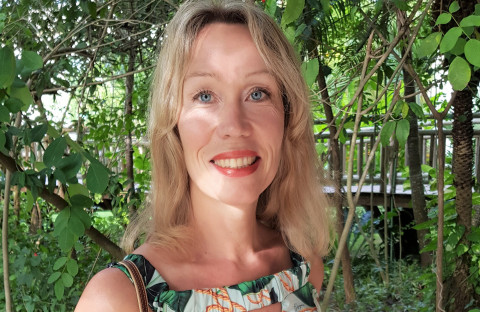Young people around the world have been organising climate strikes, demanding the adults to take more responsibility for the climate crisis. At the same time, young people want that parents, teachers and politicians talk more positively about climate change.
Researcher Nina Tokola says that finding a middle ground or seeing shades of grey instead of just black and white is often difficult when discussing climate issues. She has been involved in developing a model for giving young people the opportunity to seek solutions for dealing with, for example, their climate anxiety with a mentor.
“We do not want to use science to visualise eco-dystopias or threats. Our approach is resource-centric and aimed at creating various tools for bringing hope.”
Tokola takes part in the ALL-YOUTH research project that explores the capacities of young people (aged between 16 and 25) and the obstacles that hamper their engagement with society, as well as their views on sustainable development, growth and well-being. The research project seeks new solutions to promoting the active citizenship of young people.
“Our objective is to start discussing climate concerns in a more solution-oriented way and to support the environmental citizenship of young people.
Tackling the climate change one goal at a time
‘Circular Knowledge’ is a model that has been jointly developed by the Finnish Red Cross, Sivis Study Centre, Forest Centre, the Centres for Economic Development, Transport and the Environment for North Karelia and South Karelia, Environment Online, and Ohjaamo Joensuu. The model is based on the mentoring model of the Finnish Red Cross, which the organisation uses to identify the skills and knowledge of asylum seekers and to improve their working life skills.
“The mentoring model seeks to identify skills and knowledge that may be difficult to identify due to asylum seekers coming from different backgrounds and countries, and the differences in their previous education and perceptions of working life.
Trust and discourse is needed to discover the competencies and identify the tacit knowledge of young people. The model developed in the ALL-YOUTH research project is for reaching out to young people during the various stages of transition in education when they are deciding which path to choose for their studies or career. The model is flexible so that it can be applied to all kinds of personal goals and situations in life that young people may have.
“Young people who join the mentoring programme are not expected to tackle climate change as a whole. For example, a young person could be interested in the circular economy and how to incorporate it into their studies. Experts in the circular economy are able to provide this person with deeper insight and sparring to support their plans and ideas for the future.

Taking responsibility for sustainable development
The ‘Circular Knowledge’ model is currently being put into practice in cooperation with Sivis Study Centre. With the support of Sivis, discussion groups are being formed around individual and group activities related to civic engagement.
“This versatile operating model is suitable for this day and age, combining contents that we find important, such as the well-being of young people and reacting to their climate worry, the ability to maintain a line of communication between people of all ages and learn from each other, and identifying one’s personal competencies so as to enable their continued development, says Specialist Lea Lihavainen at Sivis Study Centre.
The priorities of the model include peer learning and active citizenship, which Sivis has chosen as its key objectives and values. The model was put into practice with interested parties in an informational and motivational webinar held in the spring. Three groups will start in the autumn in Joensuu, and new groups are being established in other cities in Finland as well. One group that is open to everyone was also established in Joensuu in July, and anyone interested in joining it should contact Lea Lihavainen.
We aim to make the concept of climate anxiety more resource-centric.
Nina Tokola
Researcher
A call for businesses
The researchers are hoping that businesses would also start using Circular Knowledge. The model gives businesses the opportunity to better understand the ever-changing expectations that young people have when it comes to working life.
“Young people have a high level of general awareness. Not everyone values a lofty salary above anything else anymore. Young people expect their work to correspond with their values and their employer to act responsibly,” Tokola explains.
The exceptional circumstances caused by the coronavirus pandemic have also made many people stop and think about the fundamental issues in society. There is also a lot of public debate on the definition of civilisation and wealth in this new situation.
“Individuals and businesses have started to question the meaning of progress. It will not be the same after Covid-19. Young people are already willing to make changes, even when it requires sacrificing convenience.
Photo on top of page: Young people have been urging adults to take action to curb climate change by organising climate strikes all around the world.
